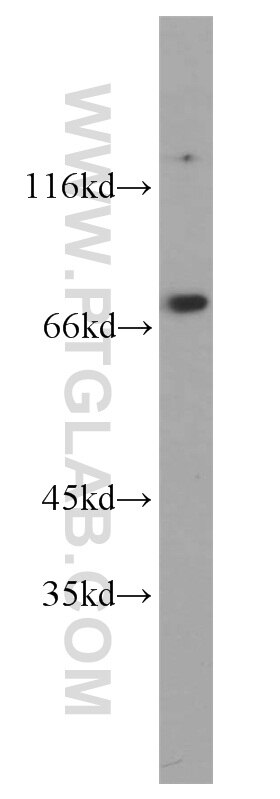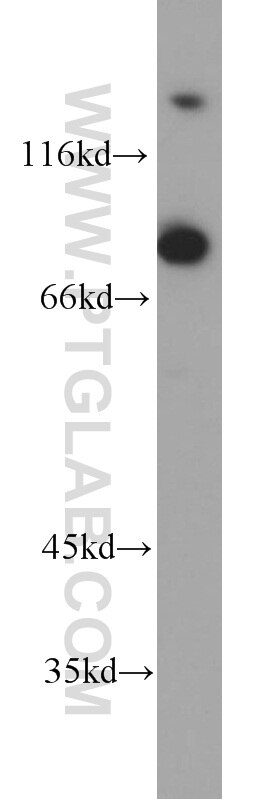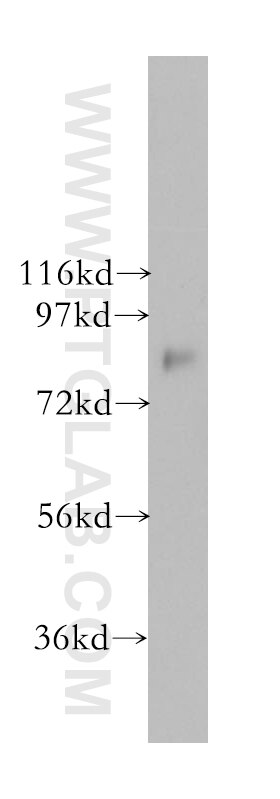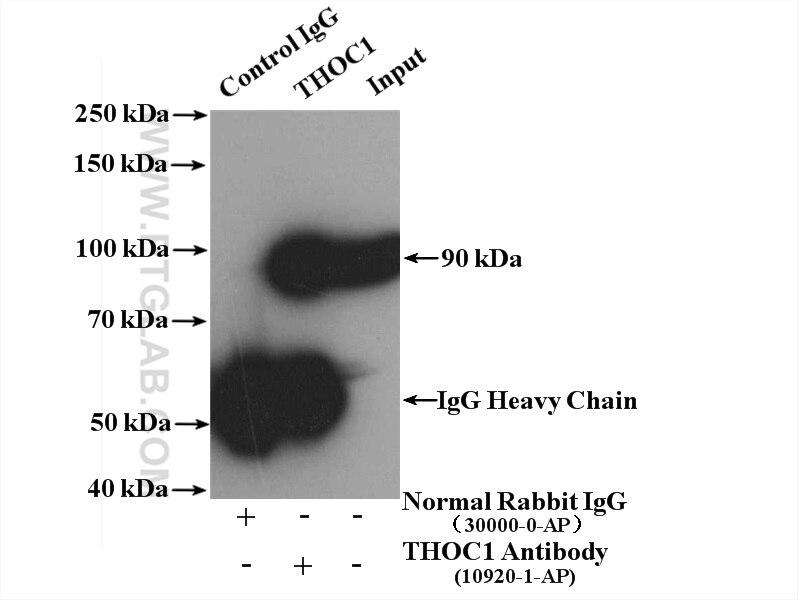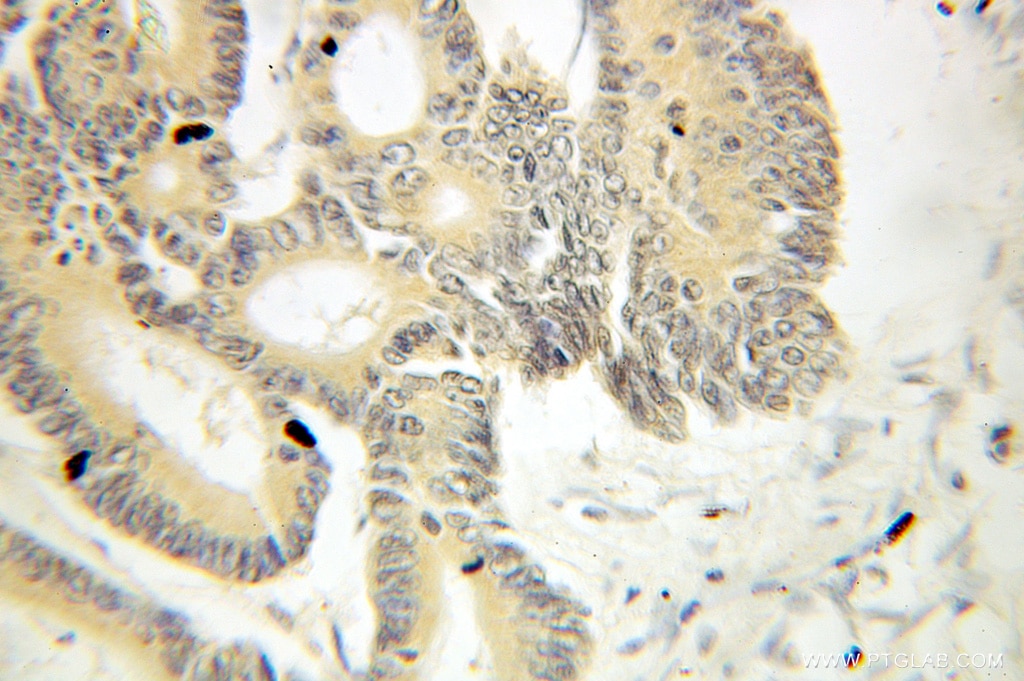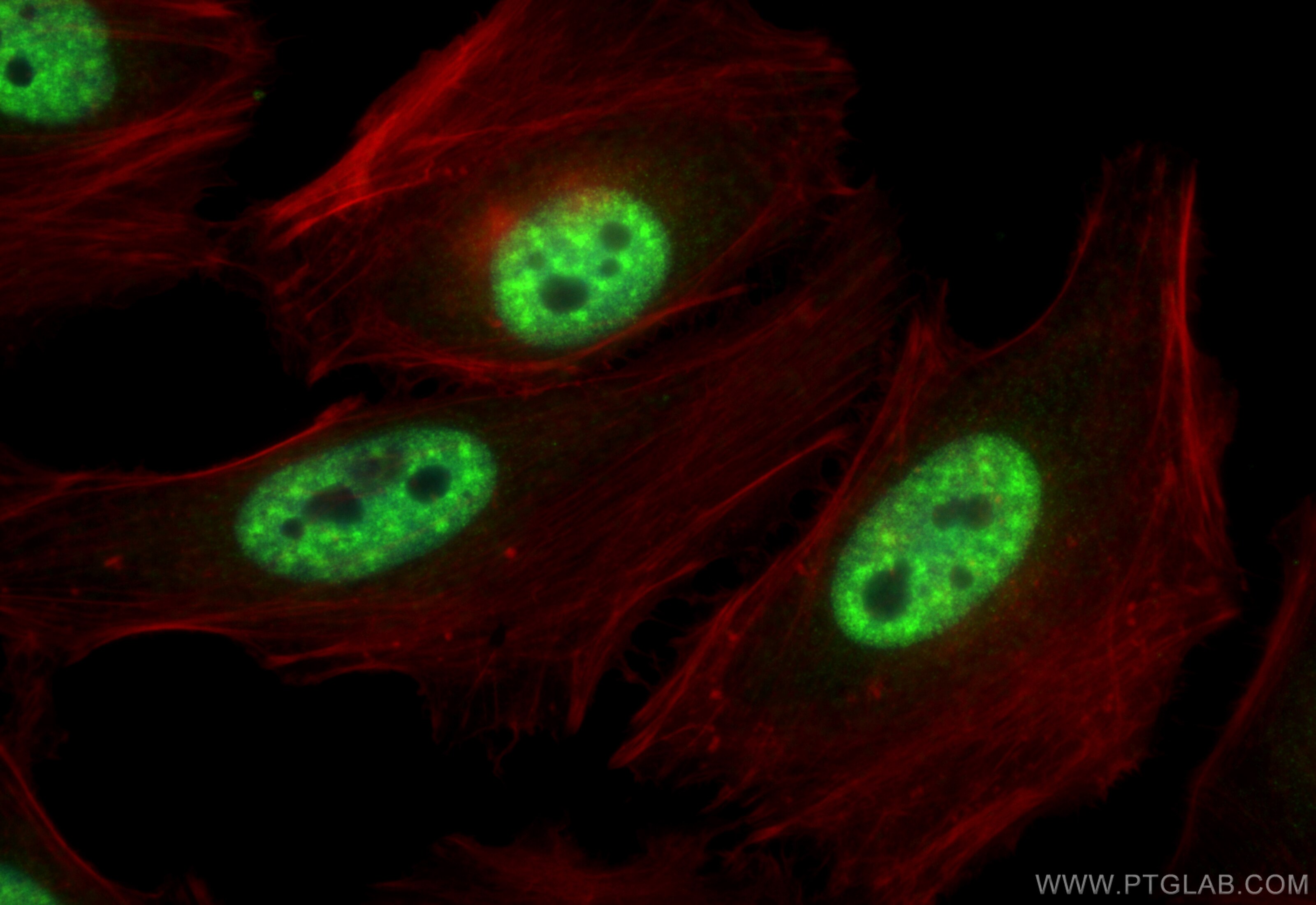Tested Applications
| Positive WB detected in | HEK-293 cells |
| Positive IP detected in | HEK-293 cells |
| Positive IHC detected in | human colon cancer tissue Note: suggested antigen retrieval with TE buffer pH 9.0; (*) Alternatively, antigen retrieval may be performed with citrate buffer pH 6.0 |
| Positive IF/ICC detected in | HeLa cells |
Recommended dilution
| Application | Dilution |
|---|---|
| Western Blot (WB) | WB : 1:500-1:1000 |
| Immunoprecipitation (IP) | IP : 0.5-4.0 ug for 1.0-3.0 mg of total protein lysate |
| Immunohistochemistry (IHC) | IHC : 1:20-1:200 |
| Immunofluorescence (IF)/ICC | IF/ICC : 1:50-1:500 |
| It is recommended that this reagent should be titrated in each testing system to obtain optimal results. | |
| Sample-dependent, Check data in validation data gallery. | |
Published Applications
| KD/KO | See 1 publications below |
| WB | See 19 publications below |
| IHC | See 1 publications below |
| IF | See 2 publications below |
Product Information
10920-1-AP targets THOC1 in WB, IHC, IF/ICC, IP, ELISA applications and shows reactivity with human, mouse, rat samples.
| Tested Reactivity | human, mouse, rat |
| Cited Reactivity | human, mouse, rat |
| Host / Isotype | Rabbit / IgG |
| Class | Polyclonal |
| Type | Antibody |
| Immunogen |
CatNo: Ag1352 Product name: Recombinant human THOC1 protein Source: e coli.-derived, PGEX-4T Tag: GST Domain: 291-657 aa of BC010381 Sequence: TGGEHVYFAKFLTSEKLMDLQLSDSNFRRHILLQYLILFQYLKGQVKFKSSNYVLTDEQSLWIEDTTKSVYQLLSENPPDGERFSKMVEHILNTEENWNSWKNEGCPSFVKERTSDTKPTRIIRKRTAPEDFLGKGPTKKILMGNEELTRLWNLCPDNMEACKSETREHMPTLEEFFEEAIEQADPENMVENEYKAVNNSNYGWRALRLLARRSPHFFQPTNQQFKSLPEYLENMVIKLAKELPPPSEEIKTGEDEDEEDNDALLKENESPDVRRDKPVTGEQIEVFANKLGEQWKILAPYLEMKDSEIRQIECDSEDMKMRAKQLLVAWQDQEGVHATPENLINALNKSGLSDLAESLTNDNETNS Predict reactive species |
| Full Name | THO complex 1 |
| Calculated Molecular Weight | 84 kDa |
| Observed Molecular Weight | 84 kDa |
| GenBank Accession Number | BC010381 |
| Gene Symbol | THOC1 |
| Gene ID (NCBI) | 9984 |
| RRID | AB_2202239 |
| Conjugate | Unconjugated |
| Form | Liquid |
| Purification Method | Antigen affinity purification |
| UNIPROT ID | Q96FV9 |
| Storage Buffer | PBS with 0.02% sodium azide and 50% glycerol, pH 7.3. |
| Storage Conditions | Store at -20°C. Stable for one year after shipment. Aliquoting is unnecessary for -20oC storage. 20ul sizes contain 0.1% BSA. |
Background Information
THOC1 (THO complex subunit 1), also known as Tho1, P84, HPR1 or P84N5, is a 657 amino acid nuclear matrix protein and is evolutionarily conserved from yeast to humans. THOC1 contains one death domain and is a component of the heteromultimeric THO/TREX (transcription/export) complex along with THOC2, THOC3, BAT1 and ALY. The THO/TREX complex is recruited to transcribed genes and travels along with RNA polymerase II (Pol II) during elongation, coupling elongating Pol II with RNA splicing and export factors. THOC1 is expressed at high levels in breast cancer cells and at relatively low levels in normal epithelia. A reduction of THOC1 in cancer cell lines results in promoted cancer cell apoptosis and reduced cell proliferation. This suggests that cancer cells are dependent on the high levels of THOC1 expression and therefore THOC1 may be a good target for cancer therapy. This antibody recognizes the 84kd THOC1 protein.
Protocols
| Product Specific Protocols | |
|---|---|
| IF protocol for THOC1 antibody 10920-1-AP | Download protocol |
| IHC protocol for THOC1 antibody 10920-1-AP | Download protocol |
| IP protocol for THOC1 antibody 10920-1-AP | Download protocol |
| WB protocol for THOC1 antibody 10920-1-AP | Download protocol |
| Standard Protocols | |
|---|---|
| Click here to view our Standard Protocols |
Publications
| Species | Application | Title |
|---|---|---|
J Med Virol SHFL inhibits enterovirus A71 infection by triggering degradation of viral 3Dpol protein via the ubiquitin-proteasome pathway | ||
Cancer Lett TIMELESS confers cisplatin resistance in nasopharyngeal carcinoma by activating the Wnt/β-catenin signaling pathway and promoting the epithelial mesenchymal transition. | ||
Elife Post-transcriptional repression of circadian component CLOCK regulates cancer-stemness in murine breast cancer cells. | ||
Cancers (Basel) Cytoplasmic Clusterin Suppresses Lung Cancer Metastasis by Inhibiting the ROCK1-ERK Axis. | ||
Biochem Pharmacol Modulation of cell physiology by bispecific nanobodies enabling changes in the intracellular localization of organelle proteins | ||
Cell Oncol (Dordr) Bioactive peptide inhibits acute myeloid leukemia cell proliferation by downregulating ALKBH5-mediated m6A demethylation of EIF4EBP1 and MLST8 mRNA. |

